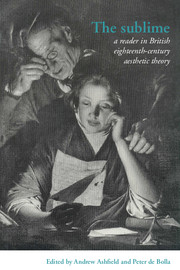Book contents
- Frontmatter
- Contents
- List of Abbreviations
- Introduction
- Part I The Longinian tradition
- Part II Rhapsody to rhetoric
- 11 The spectator, (1712-1714)
- 12 A discourse on ancient and modern learning (1734)
- 13 Characteristicks (1714)
- 14 The works (1724)
- 15 To David Fordyce, 18th June 1742
- 16 The pleasures of imagination (1744)
- 17 An essay on the sublime (1747)
- 18 Observations on man (1749)
- 19 Lectures on the sacred poetry of the Hebrews (1753/1787)
- 20 A dictionary of the English language (1755)
- 21 Conjectures on original composition (1759)
- 22 The art of speaking (1761)
- 23 A course of lectures on oratory and criticism (1777)
- 24 An enquiry concerning the principles of taste (1785)
- Part III Irish Perspectives
- Part IV The Aberdonian Enlightenment
- Part V Edinburgh and Glasgow
- Part VI From the Picturesque to the Political
- Sources and further reading
21 - Conjectures on original composition (1759)
Published online by Cambridge University Press: 05 June 2012
- Frontmatter
- Contents
- List of Abbreviations
- Introduction
- Part I The Longinian tradition
- Part II Rhapsody to rhetoric
- 11 The spectator, (1712-1714)
- 12 A discourse on ancient and modern learning (1734)
- 13 Characteristicks (1714)
- 14 The works (1724)
- 15 To David Fordyce, 18th June 1742
- 16 The pleasures of imagination (1744)
- 17 An essay on the sublime (1747)
- 18 Observations on man (1749)
- 19 Lectures on the sacred poetry of the Hebrews (1753/1787)
- 20 A dictionary of the English language (1755)
- 21 Conjectures on original composition (1759)
- 22 The art of speaking (1761)
- 23 A course of lectures on oratory and criticism (1777)
- 24 An enquiry concerning the principles of taste (1785)
- Part III Irish Perspectives
- Part IV The Aberdonian Enlightenment
- Part V Edinburgh and Glasgow
- Part VI From the Picturesque to the Political
- Sources and further reading
Summary
The mind of a man of genius is a fertile and pleasant field, pleasant as Elysium, and fertile as Tempe; it enjoys a perpetual spring. Of that spring, originals are the fairest flowers: imitations are of quicker growth, but fainter bloom. Imitations are of two kinds; one of nature, one of authors: the first we call originals, and confine the term imitation to the second. I shall not enter into the curious enquiry of what is, or is not, strictly speaking, original, content with what all must allow, that some compositions are more so than others; and the more they are so, I say, the better. Originals are, and ought to be, great favourites, for they are great benefactors; they extend the republic of letters, and add a new province to its dominion: imitators only give us a sort of duplicates of what we had, possibly much better, before; increasing the mere drug of books, while all that makes them valuable, knowledge and genius, are at a stand. The pen of an original writer, like Armida's wand, out of a barren waste calls a blooming spring: out of that blooming spring an imitator is a transplanter of laurels, which sometimes die on removal, always languish in a foreign soil.
But suppose an imitator to be most excellent (and such there are), yet still he but nobly builds on another's foundation; his debt is, at least, equal to his glory; which therefore, on the balance, cannot be very great.
- Type
- Chapter
- Information
- The SublimeA Reader in British Eighteenth-Century Aesthetic Theory, pp. 113 - 115Publisher: Cambridge University PressPrint publication year: 1996
- 1
- Cited by

